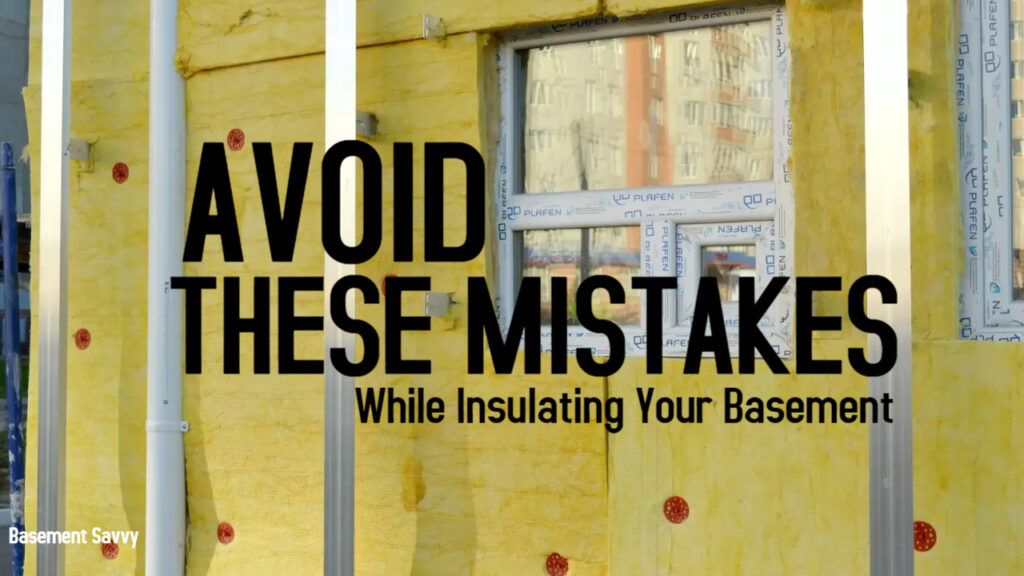Do you intend to insulate your basement? To ensure that your insulation is effective and offers the benefits you’re looking for, avoid these common mistakes. Our thorough guide covers everything you need to know, from selecting the appropriate insulation to proper installation and maintenance. By avoiding these common mistakes with basement insulation, you can increase the comfort, indoor air quality, and energy efficiency of your home.
Understanding the Importance of Basement Insulation
Before we dive into the mistakes, it’s essential to understand why basement insulation is crucial. Insulating your basement can help:
- Increase the comfort of your home by keeping the temperature consistent.
- Reduce energy bills by preventing heat loss through the basement walls and floors.
- Prevent moisture issues by keeping the basement warmer and drier.
- Improve indoor air quality by reducing the amount of outdoor air that enters your home.
Mistake #1: Not Air Sealing the Basement First
To stop air leaks, it is necessary to air seal any gaps, cracks, or holes in the foundation, rim joists, and basement walls. Failure to air seal a building before insulating it can lead to air leaks, which decrease the efficiency of the insulation and raise energy costs. As warm, humid air from outside can enter the basement and condense on the cooler walls and floors, it can also cause moisture issues.
Mistake #2: Using the Wrong Type of Insulation Material
Another common error is picking the wrong kind of insulation material. The most typical type of insulation used in basements is fiberglass batt insulation, but it isn’t always the best choice. Mold and mildew can easily grow as a result of fiberglass insulation’s ability to trap moisture. Additionally, it is ineffective as a defense against air leaks. Spray foam insulation with closed cells is preferable because it not only insulates but also air seals and creates a moisture barrier.
Mistake #3: Failing to Insulate the Rim Joist
The junction of the basement walls and the floor joists above is known as the rim joist. This location is frequently where air leaks occur, which can lead to energy loss and moisture issues. Additionally, failing to insulate the rim joist can make the basement feel colder, lowering your home’s overall comfort.
Mistake #4: Not Using Vapor Barriers Correctly
To stop moisture from harming the insulation by getting inside, a vapor barrier is used. However, improper vapor barrier use can cause issues. The wrong side of the insulation for the vapor barrier can trap moisture, encouraging the growth of mold and mildew. To place the vapor barrier properly, it is imperative to seek professional advice.
Mistake #5: Not Hiring a Professional
Although it may seem like a simple DIY project, hiring a professional is necessary to ensure the job is done correctly. In order to maximize energy savings and comfort, a professional can assist you in avoiding the common blunders mentioned above and can make sure that your basement is adequately insulated.
Mistake #6: Over-Insulating
While properly insulating your basement is important, going overboard can cause issues. Moisture issues can arise from excessive insulation because it can keep moisture in the walls and floors. Additionally, it may make it more challenging to spot issues like water leaks or the development of mold.
Mistake #7: Ignoring the Importance of Ventilation
Ventilation is essential for preserving healthy indoor air quality and avoiding moisture issues. Mold growth and poor indoor air quality can be caused by inadequate ventilation. It’s crucial to make sure your basement has adequate ventilation, whether it comes from mechanical or natural means.
FAQs
Yes, it’s necessary to insulate your basement to reduce energy bills, prevent moisture problems, and improve indoor air quality.
While it’s possible to insulate your basement yourself, it’s crucial to hire a professional to ensure that it’s done correctly and avoid common mistakes.
Closed-cell spray foam insulation is the best type of insulation for basements, as it not only insulates but also air seals and provides a moisture barrier.
You can tell if your basement insulation is working correctly by monitoring your energy bills and checking for signs of moisture or mold growth.
Basement insulation can last for many years, but it’s essential to monitor it regularly and replace it if you notice signs of damage or wear.
Conclusion
Insulating your basement is an excellent investment that can help reduce energy bills and increase the comfort of your home. However, it’s crucial to avoid common mistakes that can lead to costly problems down the road. By understanding the importance of basement insulation and avoiding the mistakes outlined in this article, you can ensure that your basement is adequately insulated and protected from moisture problems.
If you have any questions or concerns about insulating your basement, it’s essential to consult with a professional who can guide you through the process and ensure that it’s done correctly. Remember, proper insulation can not only save you money on energy bills but also improve the overall health and comfort of your home. Connect with Basement Savvy to learn more about Basement Ideas.

